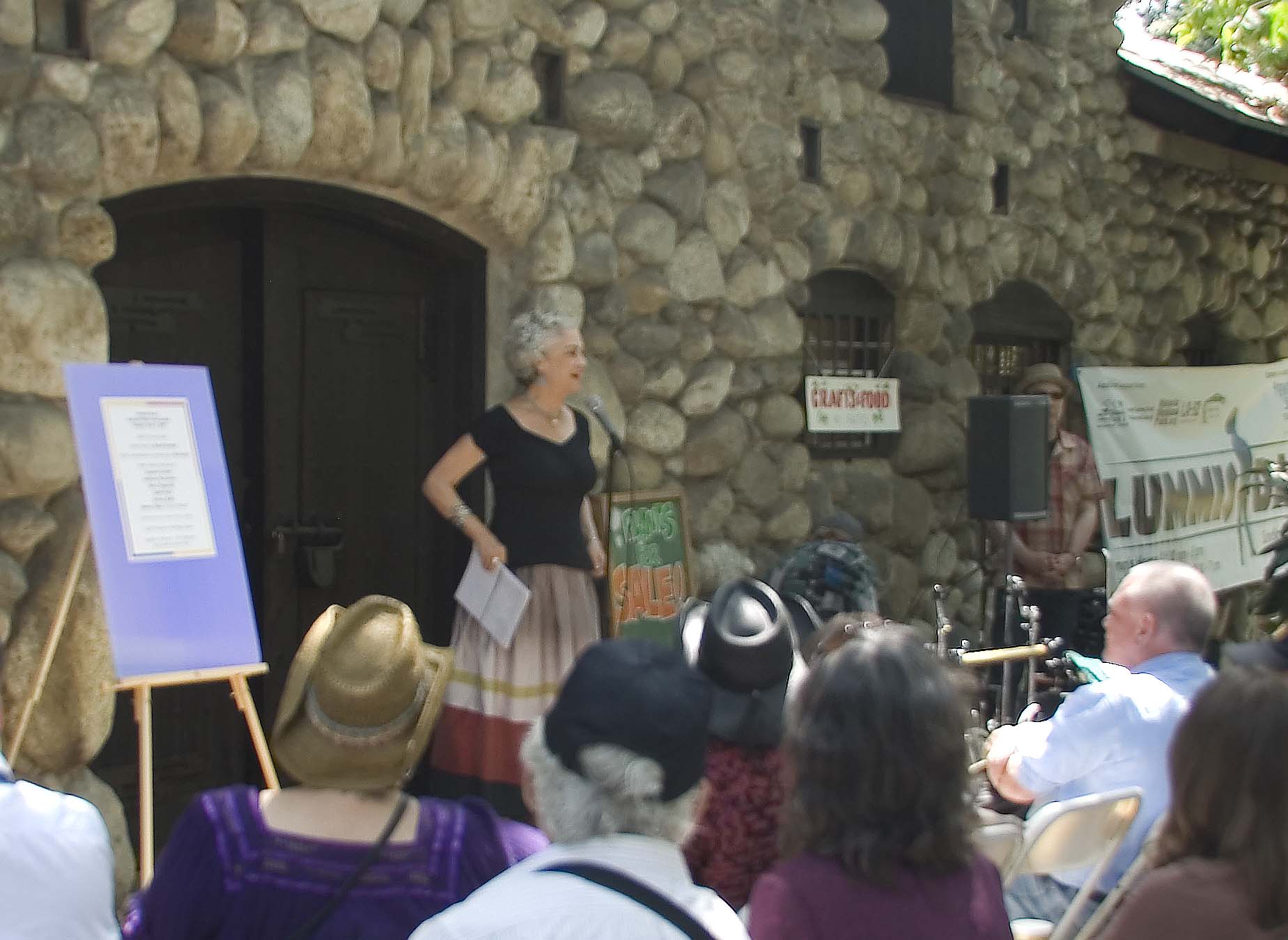P&W–sponsored poets Mary Fitzpatrick and Judith Pacht were among the writers who performed June 3 at Lummis Day, an annual festival celebrating journalist and activist Charles Fletcher Lummis and Northeast Los Angeles. P&W intern David Chun reports.
Held on the lawn of the historic Lummis Home, El Alisal, the Sunday morning poetry reading at the Seventh Annual Lummis Day drew a friendly audience of families, students, and seniors from diverse backgrounds. A jazz duo set a peaceful counterpoint to the stream of traffic on the 110 freeway rushing by behind the property’s sycamores.
Chumash storyteller Ted Garcia opened the reading with a traditional blessing, thanking the Creator for our safe travels, our elders, our children, and all that we have. The poetry program included Suzanne Lummis (Charles Fletcher Lummis’s granddaughter), Mary Fitzpatrick, Judith Pacht, Jeremy Radin, and Hector Tobar. All are Angelenos whose work confronts human responsibility in the environment, an issue close to Charles Lummis’s heart. But the diversity in the writers’ styles was a true celebration of Los Angeles literary culture.
Any audience members expecting banal praises of California sunshine had their eyes opened when Suzanne Lummis kicked off the reading with “Gone Baby,” a poem which she described as a fairy tale for the children of the economic collapse. The poem worked as both a eulogy for the golden age of economic prosperity in America, and a prayer of hope for recovery.  Mary Fitzpatrick elegantly flipped from ironic meditations on the innocence of young love to a scathing review of the social masks so normal to Angeleno life. Her poem “Pompeii” concluded with a question: Is our culture evolving, or are we as trapped in artifice as the civilization of Pompeii after the historic volcano eruption encased it in stone?
Mary Fitzpatrick elegantly flipped from ironic meditations on the innocence of young love to a scathing review of the social masks so normal to Angeleno life. Her poem “Pompeii” concluded with a question: Is our culture evolving, or are we as trapped in artifice as the civilization of Pompeii after the historic volcano eruption encased it in stone?
Judith Pacht’s reading whisked the audience away on a dizzying tour of desert life, then zoomed in on an asphalt parking lot built among the ancient sands “like a buckled mirror [that] twists and distorts.”
A highlight of the morning was a surprise reading from poet Jeremy Radin (filling in for Ilya Kaminsky). His poems “Off Switch” and “Slowdance With Sasquatch” navigated the subjects of parenting and beauty with humor and dark tinges. The audience laughed, contemplated, and applauded. He closed with “The Last Invitation, September 5, 1895,” a piece adapted from historical correspondence between President Teddy Roosevelt and a pig farmer whose stock was so often killed off by bears that he arranged annual bear hunts with the president to get revenge. The farmer pleaded: “bears don’t die like other animals. When the knife bites / into their pulse, you can see them understand.” By the conclusion of the poem, the speaker is wary of the country’s mad rush for private property and subsequent disregard for nature.
Hector Tobar’s excerpt from his novel The Barbarian Nurseries delighted the audience with its meditation on the funny and often painful differences between Mexican and American views on everything from party etiquette to the homeless.
Suzanne Lummis closed the reading with a heartfelt reminder of the importance of good books in the home. Then the audience made their way across the arroyo, where they enjoyed the live local music and fresh food.
Photo: Mary Fitzpatrick reads at El Alisal. Credit: Eliot Sekuler.
Major support for Readings/Workshops in California is provided by The James Irvine Foundation. Additional support comes from the Friends of Poets & Writers.






